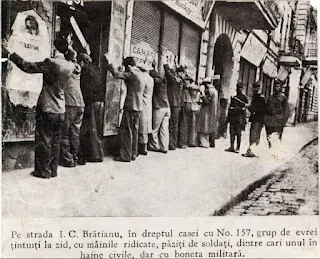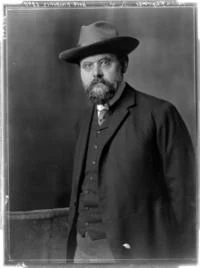The metaphysics of paper is not only the metaphysics of writing. It is the metaphysics that grounds 'intellectual property".
Although
we live in the era of the resurgence of piracy against monopoly – the latter in
the form of IP claims – we don’t entirely realize what the modern enclosure
movement is all about, or how tangled is its history.
Intellectual
property was recognized, as every
history recounts, first in Venice in the 15th century. But the more
interesting arguments about intellectual property begin in the 18th
century. It was at this time that we see two different trends: one trend was
towards breaking up guilds and destroying the power of “craft secrets” –and the
other was towards rewarding authors rights on the products of their “mental
labor.”
England,
which made the leap into industrial capitalism in the eighteenth century, has
gained the most attention from historians of intellectual property. However,
France also had laws pertaining to licensing invention. These notions culminated in
Le
Chapelier's report to the Convention in 1791 urging a law to assure
the right in property of an author to his work. This property was not just
another property, like a horse, a slave in Santo Domingo, or a house: the
“fruit of the thought of a writer” was
“the most sacred, the most legitimate, the most unattackable, and if one may
say so, the most personal of all properties.” These accolades are heavy as the
marble laurel wreath crowns on the head of a bust. They seem strange. How can
the most personal of properties even exist as a property – that is, as an
exchange value?
Le Chapelier's report was preceded by a long line of enquiry among the philosophes. In particular, by Diderot.
Diderot, was one of the first great advocates of the author’s
property in his work in France. But, as Liliane Hilaire-Perez (2002), who works on
intellectual property history, has pointed out, Diderot distinguished between
the very personal property of the author from what he took to be the craft
secrets of mechanical invention – the latter of which were dubious properties.
In his History and Secret of Wax Painting, an extended case study of a contemporary invention, Diderot
wrote:
“Nothing
is more contrary to intellectual
progress than mystery. We would still be at trying to understand the simplest
and most important arts if those who discovered them made them secret. Far from
us, thus, that spirit of interest or pride which seems to conspire with the
natural imbecility of man and the briefness of his life to perpetuate his
ignorance…”
Mystery,
here, really means mystification.
“The main issue for Diderot was to explain
that technical invention relied on a method, an ‘art’, which was not actually
the case in artistic creativity; the crucial point was the understanding of the
concepts of cumulation and imitation in the process of invention.” (2002)
Diderot
wrote his history of wax painting against the background of the French monarchy’s
practice of encouraging invention by awarding brevet to those inventions
thought worthy by the state. This entailed some kind of state reward and a
right to demand compensation from users of the invention. The point of the
system, which was devised under Colbert, was to encourage the arts. This, in fact, was also used as
a justification for the monopoly system
of patenting in the Anglosphere. In a sense, both justifications were
responding to Diderot’s distinction between, as Hilaire-Perez puts it, genius
and method.
This
distinction may seem rather self-interested: Diderot as a writer is, in a
sense, part of the guild. On the other hand, it does make some conceptual sense, within the conceptual scheme that brings together definition, property, invention and discovery. Tumblers in - I will boldly say - all the locks of the modern.
We
can think of this distinction through the lens of one of Borges’ most famous
stories, Pierre Menard: the author of Don Quixote. In this story, Pierre
Menard, a French symbolist, decides to write the Don Quixote as a new work. He
doesn’t mean by this that he will borrow Cervantes’ stories, or characters: he
means by this that he will reinvent Don Quixote word for word, and thus make is
a twentieth century work. Obviously, Pierre Menard’s word for word ‘writing’ of
Don Quixote is, on one level, simply copying the text. But Borges’ narrator
emphasizes that Menard did not simply copy – he also wrote drafts leading up to
his copy, just as though he were writing the book himself. And, in a final turn
of the modernist screw, he destroyed those drafts, because he wanted the work
to be pure of the author’s presence – which was also part of writing the Don
Quixote as a modernist text, one that shows the influence of the Flaubertian
aesthetic of impersonality.
That,
eventually, at some point, in order to write the Don Quixote in the twentieth
century, Menard had to copy Cervante’s text, is part of the Borges’ joke. There
would be no paradox, however, if we turned from writing a novel to, for
instance, inventing the process for vulcanizing rubber. In fact, in 1852,
Charles Goodyear took Horace Day to court on patent infringement because Day
was using vulcanized rubber. Goodyear’s case was argued by Daniel Webster.
Goodyear hadn’t made much on his rubber, and it was reported that he wanted a
seven year extension on his patent, which was running out – so he may have
intentionally been looking around for a case.
Choate, Day’s lawyer, “marshaled
convincing testimony from rubber factory employees that vulcanization
was in common use in the early 1840s” (Handbook of American Business History).
In fact, Goodyear had already paid Nathaniel Hayward for the idea – or rather,
the patent rights - of adding sulfur to rubber. But it was, according to
Goodyear, not method but accident that made the difference in the vulcanizing
process. Goodyear mixed sulfur with rubber and accidentally dropped the rubber
on a hot pan. He took the rubber out of the pan and left it to cool, and found
that it became much more durable – just what he was looking for.
However,
there is another part of this famous story that is not usually included in
canonical American accounts: Goodyear’s patent included lead as an ingredient
in the vulcanization process. This proved to be a point against him in England.
There,
Goodyear came up against Thomas Hancock, who had already ‘invented’ impermeable
clothing – waterproof cloth. Hancock got a sample of vulcanized rubber. He was
able to analyse it and reproduce the process – and subsequently patented it
himself. In a report of a “jury” of scientists in England for the Great
Exhibition of 185 – the Crystal Palace – which examined the dispute between Hancock and Goodyear, both parties
were credited with working out the vulcanization process. While the jury
conceded that Goodyear had produced vulcanized rubber before Hancock, it also
noted that Hancock knew nothing of Goodyear’s process. Rather, he discovered
for himself the crucial determinant of heating the rubber. More than that,
unlike Goodyear, Hancock understood what he was doing: that is, he understood
what caused vulcanization. “Whatever may be the share of merit assigned to Mr.
Goodyear and to Mr. Hancock in this important invention, the latter has not the
less exclusive merit of having discovered that sulphur was the sole cause of the vulcanization process. On
seeing Mr. Charles Goodyear introducing the different salts of lead into the
specification of the patent that he subsequently took out, it is felt that he
regarded their intervention as
indispensable, while it is now demonstrated that sulphur alone is
sufficient.”
Between
Thomas Hancock and Pierre Menard there is a superficial similarity: both
reproduced a product of invention. But Pierre Menard’s story is a paradox
precisely because the invention of the Don Quixote by Cervantes is not just of
the ideas, or the process, of making Don Quixote, but of the entire work – a
work which wears its process, so to speak, on its face. Whereas the
vulcanization of rubber is not an invention of Goodyear’s imagination. It is,
rather, the encounter of different materials pre-existing in nature. Hancock’s
work was comparatively simple – a matter of chemical analysis – whereas
Menard’s work is impossible – he cannot so analyse Don Quixote so as to repeat
it. He can only, eventually, in spite of everything, copy it.





